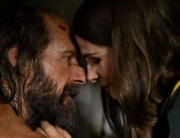A number of recent documentaries have centered on individuals who either transitioned or are transitioning, but the fascinating Markie in Milwaukee, which recently had its world premiere at the Slamdance Film Festival, stands out from the rest. Mark Wenzel, who was born male, began living publicly as female eight years ago and has now decided to de-transition; that is, to resume his male identity. What follows is a chronicle of Wenzel attempting to re-integrate himself into the world he left behind, as well as a deep dive into the past for a better understanding of the forces that have shaped his very unique journey.
Director Matt Kliegman, who has years’ worth of footage of Wenzel during her near-decade as Markie Anna, constantly goes back to the photographs, audio recordings, and video of the subject going all the way back to his youth. Through these artifacts, we get a sense of just how long he had been wrestling with the desire to be female and how much effort he put into trying to deny it for much of his life. Before transitioning to Markie Anna, Wenzel entered into a traditional marriage and became a devout Christian minister, but years later, he’s firmly estranged from both. In particular, Wenzel’s grown-up children still seem confused by their father’s past actions, and during one especially heartbreaking interview, his daughter admits her belief that Mark broke up the family because she didn’t make him happy enough.
In fact, Wenzel gives up being Markie Anna in an effort to re-connect with both his family and the fundamentalist Baptist church he had belonged to. Now in his mid-50s, he stoically goes through the process of wearing men’s clothing again, and he describes himself as having been “wicked.” What makes these moments especially powerful is how sincerely he chastises himself. Viewers definitely get the impression that throughout the time Wenzel spent transitioning, a part of Markie Anna felt it was wrong, a sin against her creator. What makes the subject matter so compelling is how much of a walking paradox Wenzel is. Based on the footage of Markie Anna, there is no denying that she is free and comfortable. Her sense of happiness when socializing with her co-workers is downright infectious.
That Wenzel himself, much less anyone, could view Markie Anna as immoral comes across like a terrible rush to judgment. Yet we also understand how isolated an existence Wenzel leads, and we come to understand just how much that wore Markie Anna down during the eight years spent transitioning. Yes, there are more progressive Christian churches in Wenzel’s vicinity, but as the film explains, the different branches of Christianity are like separate languages. His former fundamentalist Baptist pastor expresses little regard for transgender persons, but in Wenzel’s heart, it is still his church.
Heading down the home stretch, the real suspense derives less on whether he gets back what he lost but what will be the cost of doing so. If Mark exists, does that mean Markie Anna cannot? Despite occasionally wallowing in dark emotions that are perfectly matched by the desolate Midwestern scenery, the film closes on an optimistic note, suggesting the possibility of having one’s cake and eating it, too.







Leave A Comment